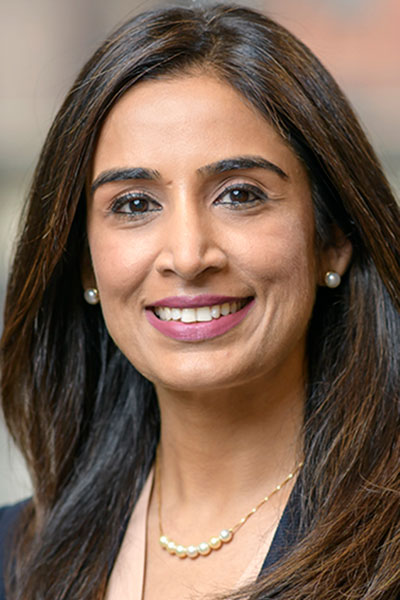Translational medicine works to develop clinical practice applications for basic science, and it also has its share of controversial topics. SABCS® is bringing back the “lightning discussion” session format to highlight and present opinions on these topics.
Translational Research Controversies, set for 1:30 – 2:30 p.m. CT, Friday, December 8 in the Stars at Night Ballroom 3-4, will highlight three controversies within this area of interdisciplinary medicine.
The discussion format is not a debate, but instead it will use examples and discussion to help attendees better understand the topics.

“These are not absolutes,” said session moderator Komal Jhaveri, MD, FACP, Patricia and James Cayne Chair for Junior Faculty, Section Head for the Endocrine Therapy Research Program, and Clinical Director, Early Drug Development Service at Memorial Sloan Kettering Cancer Center. “Presenters are not trying to ‘win’ a conversation. We are trying to engage everyone to understand the issues we face in these areas.”
There will be 20 minutes allotted for each of the three topics. In those 20 minutes, two expert discussants will each provide examples for 6-7 minutes, leaving 6-9 minutes of discussion and possibly time to address audience questions.
Topic 1: Baby-TAM
Discussants: Jack Cuzick, PhD, John Snow, Professor of Epidemiology, Queen Mary University of London, and Per Hall, PhD, MD, Professor and Senior Physician, Karolinska Institutet, Stockholm, Sweden
Adjuvant tamoxifen treatment reduces recurrence and death from estrogen receptor (ER)-positive breast cancer and is also approved for primary prevention. However, adherence is an issue, and one of the main reasons for this low adherence is toxicity. Drs. Hall and Cuzick will discuss the role of low-dose tamoxifen (baby-TAM). Specifically, they will discuss the advantages of baby-TAM in the context of prevention and how to best assess whether baby-TAM is as effective as full-dose tamoxifen.
Topic 2: When to do a window trial
Discussants: Mitchell Dowsett, PhD, Head of the Centre for Molecular Pathology, Royal Marsden Hospital, London, and Sara A. Hurvitz, MD, Head, Division of Hematology and Oncology, University of Washington, Fred Hutchinson Cancer Center
Drs. Hurvitz and Dowsett will discuss window-of-opportunity (WOO) or window studies. Using concrete examples, they will review the advantages of window trials and how they can assist with expediting drug development, improve our understanding of pharmacodynamic parameters, and help identify biomarkers for better patient selection. They will also briefly review how WOO studies can be used to assess endocrine response and guide subsequent treatment for an individual patient. While window studies provide these unique opportunities, they have their own challenges and risks, which the discussants will also highlight.
Topic 3: Are we sequencing too late?

Discussants: Charles M. Perou, PhD, Co-Director, Breast Cancer Research Center at UNC Lineberger Comprehensive Cancer Center, and Fabrice André, MD, PhD, medical oncologist, Gustave Roussy Cancer Center, Villejuif, France
Next-generation sequencing can help find specific mutations in metastatic breast cancer tumors. Once found, those mutations can be targeted with an already approved therapy or a therapy being studied in clinical trials that could lead to approval of that new drug.
However, despite these attempts to individualize therapy and improve outcomes, breast cancer remains the second-leading cause of death. This underscores the question of whether our attempts at sequencing the tumor and therapeutic interventions that follow are too late. What if sequencing enabled us to conduct real-time monitoring and intervene before the development of overt metastases?
Advances in circulating tumor DNA (ctDNA) assays have allowed for the detection of molecular residual disease (MRD). Drs. André and Perou will help summarize the underlying scientific principles of MRD assays, their prognostic roles, ongoing trials of therapy optimization based on MRD, and their notable limitations.
Dr. Perou, who is also a member of the SABCS® Program Planning Committee, said one of the hallmarks of the Translational Research Controversies session is that the topics are open to discussion; there isn’t an answer yet.
“And almost for sure, some of the answers that might exist vary by country and vary by even the healthcare system within the United States,” he said.

